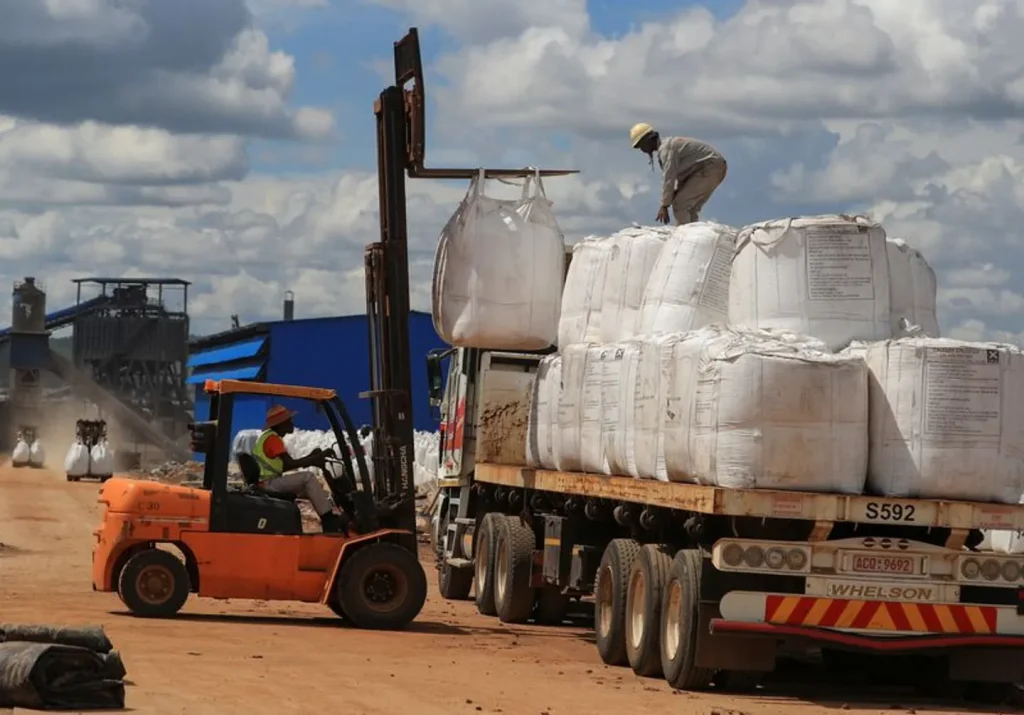Zimbabwe will enforce a complete ban on the export of lithium concentrates beginning in January 2027, Mines and Mining Development Minister Winston Chitando announced on Tuesday. The move marks a significant step in the country’s broader strategy to strengthen domestic industrial capacity and capture greater value from its mineral wealth.
As Africa’s largest lithium producer, Zimbabwe has been gradually tightening regulations around the export of raw and semi-processed lithium. In 2022, the government prohibited the export of unprocessed lithium ore, aiming to discourage the extraction of raw materials for processing abroad. Authorities are now extending this policy to concentrates—an intermediate product that still requires further refining to meet battery-grade standards.
Shift Toward Local Beneficiation
The decision to halt concentrate exports reflects Zimbabwe’s intent to build a stronger domestic value chain for lithium, which is a key component in the manufacturing of batteries used in electric vehicles, smartphones, and renewable energy storage systems. By requiring that more processing occur within Zimbabwe, the government hopes to stimulate industrial growth, generate employment, and increase revenue from its mineral sector.
Speaking after a weekly cabinet meeting, Chitando highlighted that the local processing landscape is evolving rapidly. “Because of the capacity which is now in the country, the export of all lithium concentrates will be banned from January 2027,” he said.
New Processing Plants Underway
Key developments supporting this policy shift include the construction of lithium sulphate plants at two major mining sites. One is located at Bikita Minerals, which is operated by the Chinese firm Sinomine. The other is at Prospect Lithium Zimbabwe, owned by Zhejiang Huayou Cobalt, another Chinese investor. Lithium sulphate is an essential intermediate material that can be further refined into lithium hydroxide or lithium carbonate—both critical ingredients in battery production.
These facilities are expected to significantly enhance Zimbabwe’s capacity to process lithium domestically, reducing dependence on foreign refineries and encouraging technology transfer and skill development within the country.
China’s Role in Zimbabwe’s Lithium Sector
The lion’s share of lithium mining operations in Zimbabwe is controlled by Chinese companies. Over the past few years, firms such as Sinomine, Zhejiang Huayou Cobalt, Chengxin Lithium Group, Yahua Group, and Canmax Technologies have invested heavily in the country’s lithium resources. Since 2021, these companies have collectively spent more than $1 billion acquiring mining rights and developing infrastructure to support large-scale extraction and initial processing.
Until now, most of these companies have exported lithium concentrates back to China for final processing and battery production. However, with the new 2027 ban on concentrate exports, they will be required to complete more stages of production in Zimbabwe itself.
Policy Adjustment Amid Market Volatility
In 2023, Zimbabwe gave lithium miners until March 2024 to submit plans for establishing local refineries. While this move underscored the government’s commitment to beneficiation, it was followed by a temporary softening of the policy due to a steep decline in global lithium prices. The drop in prices placed financial pressure on mining companies, leading authorities to adopt a more flexible stance to avoid deterring investment.
Nonetheless, the government has made it clear that long-term objectives remain unchanged. The new 2027 deadline signals Zimbabwe’s renewed commitment to ensuring its rich mineral resources contribute more directly to national economic development.
As the global transition to clean energy accelerates and demand for lithium continues to rise, Zimbabwe’s policy shift could position the country as a more integral player in the international battery supply chain—not just as a source of raw materials, but as a center for value-added production.



